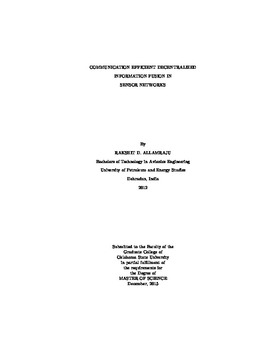| dc.contributor.advisor | Chowdhary, Girish Vinayak | |
| dc.contributor.author | Allamraju, Rakshit Dayal | |
| dc.date.accessioned | 2017-02-22T22:12:24Z | |
| dc.date.available | 2017-02-22T22:12:24Z | |
| dc.date.issued | 2015-12-01 | |
| dc.identifier.uri | https://hdl.handle.net/11244/48964 | |
| dc.description.abstract | Many physical, geological and environmental phenomena are spread over large spatio-temporal scales and require robust sensor network systems to gather data, collaborate and monitor the area for anomaly detection. In decentralized sensor networks, deployed in monitoring such events, agents are constrained to monitor localized regions and collaborate with other agents to obtain a common global model. While such sensor networks yield significant benefits such as endurance and scalability, they are constrained in amount of on-board resources available such as computational ability, communication bandwidth and fuel. In this work the problem of decentralized functional inference over a spatially separated sensor network with limited communication capability is studied. Gaussian Processes (GPs) have been studied as priors over spatially distributed functions. The key benefit of GPs is that the number and location of regression kernels, and the numerical values of associated weights, are simultaneously inferred from the underlying data. While this enables the model to adapt its structure based on the data, it also makes decentralized inference using Consensus type algorithms difficult if agents do not know each-other's kernel selection a-priori, and traditional sample based inference is communication-inefficient if all of the data is shared between agents. A new decentralized communication-efficient algorithm for decentralized information fusion over GPs is presented of which the key contribution is that agents do not have to a-priori know each-other's kernel selections. Instead, our algorithm enables agent's to build a global GP model by fusing together local compressed GPs. To further prevent unnecessary communication, the presented algorithm can utilize information theoretic measures on value-of-information to initiate broadcasts only when agents have sufficient new information. The algorithm is compared with several state of the art methods on real-world and synthetic datasets, and is shown to lead to efficient estimation accuracy with decreased communication cost, without having to assume that agents share a common set of kernels. To further evaluate the real time performance of the presented method, a multi-agent simulator system is developed as a test bench. Experiments for decentralized multi-agent planning, which use the described fusion algorithm, are conducted and the respective results are provided. | |
| dc.format | application/pdf | |
| dc.language | en_US | |
| dc.rights | Copyright is held by the author who has granted the Oklahoma State University Library the non-exclusive right to share this material in its institutional repository. Contact Digital Library Services at lib-dls@okstate.edu or 405-744-9161 for the permission policy on the use, reproduction or distribution of this material. | |
| dc.title | Communication Efficient Decentralized Information Fusion in Sensor Networks | |
| dc.contributor.committeeMember | Crick, Christopher | |
| dc.contributor.committeeMember | Bai, He | |
| osu.filename | Allamraju_okstate_0664M_14427.pdf | |
| osu.accesstype | Open Access | |
| dc.description.department | Mechanical & Aerospace Engineering | |
| dc.type.genre | Thesis | |
| dc.type.material | text | |
